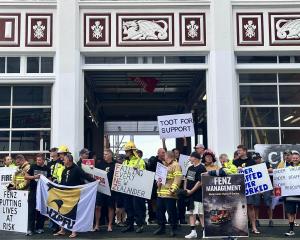Alcohol-fuelled violence and associated problems are being addressed in a variety of ways in Dunedin. Rosie Manins talks to some of those involved.
Alcohol is a key driver of crime in the Southern police district, and a factor in a third of all crime, district commander Superintendent Andrew Coster says.
''As a community we need to reflect on how the behaviour of family and friends can be negatively impacted by alcohol, and how we can all play a part in creating change to prevent this happening,'' he said.
Police raised awareness of the negative impact on people's lives from misuse of alcohol by spending more time in communities and undertaking a range of associated activities, such as foot and vehicle patrols to quell drunken disorder, road checkpoints to target drink-driving, compliance checks on licensed premises, and enforcement of liquor bans in public places, he said.
The newly implemented Sale and Supply of Alcohol Act, which came into effect on December 19, was also helping publicans, liquor licensing officers and police to manage excessive drinking in Dunedin.
Dunedin Mayor Dave Cull said excessive drinking not only led to stupid or dangerous behaviour, it also put people at risk of becoming victims themselves.
The mayor urged residents of Dunedin to try to get better at looking out for one another, especially young tertiary students.
''You might get a bit pissed and belt someone or do something stupid ... but you are just as likely to become vulnerable to someone else if you drink too much, whether it's a sexual or violent attack or a mugging,'' Mr Cull said.
Mr Cull applauded initiatives in the city which encouraged safe alcohol consumption.
He cited Emerson's Brewery T-shirts with the slogan ''drink less, enjoy more'' and the policy in some bars of serving stronger beers in smaller quantities.
''For example, I know some places will only sell 7% alcohol beer in a handle, not in a pint. I think there's a fair degree of responsibility exercised by some of our bar owners,'' he said.
Speight's Ale House owner Mark Scully said many hospitality managers in Dunedin actively encouraged safe drinking practices and rewarded sober drivers.
Mr Scully was among those to implement a Dunedin City Council initiative providing free non-alcoholic drinks to designated sober drivers.
Sober driving packs were also given out at the bar, and staff were encouraged to arrange safe transport for intoxicated patrons, he said.
There was always a licensed manager on the premises, security staff worked weekends, and non-alcoholic drinks and food were available at all times.
Mr Scully said the safest place for people to consume alcohol was at a licensed premises where sober staff, including licensed managers and security, made for a controlled environment.
Dunedin Collaboration Against Family Violence co-ordinator Rob Thomson said alcohol did not cause violence, but it did magnify violent situations.
''Alcohol does not make people violent, it's important to be quite clear about that. What it can do is exacerbate existing violence and it can result in, or increase, the escalation of violence and the severity of violence,'' he said.
Alcohol and crime
• About 80% of prisoners have committed alcohol-related or drug-related offending.
• About 80% of defendants have alcohol-dependency or drug-dependency issues.
• In any given week, thousands of people appear in courts nationally for alcohol-related offending.
• Most youth offending is alcohol-related.














